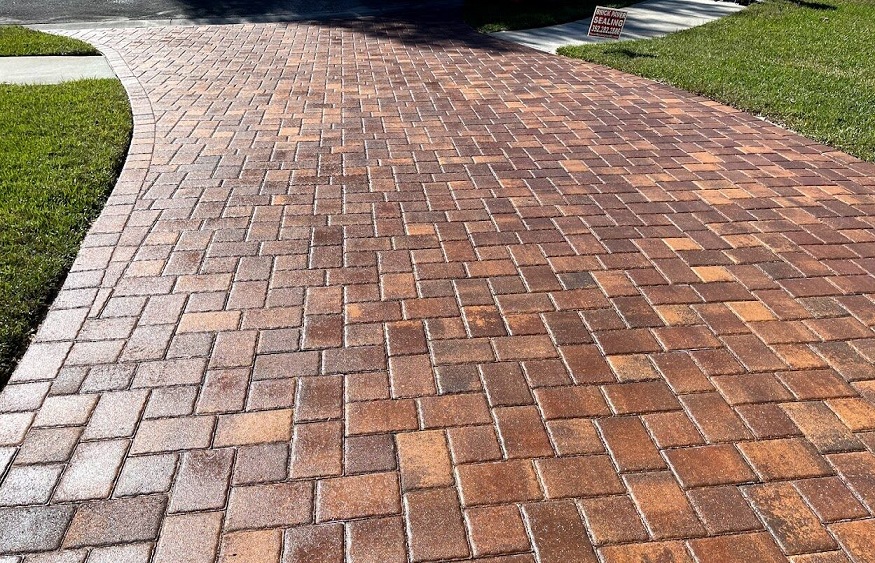To increase property appeal, great outdoor spaces frequently include concrete paver patios, driveways, and pool decks. Concrete pavers are available in an almost infinite number of sizes, colors, and maintenance requirements. If properly maintained, pavers can last a lifetime, but if not, stains or fading diminish the aesthetic value of your investment.
Why do you need paver sealing?
Although pavers are adaptable and look great in almost any outdoor setting, it is crucial to seal them in order to maintain their appearance and functionality for many years to come. Several advantages to sealing your concrete pavers include:
- The pavers’ colors are kept vibrant even in direct sunlight with the help of paver sealing. Paver sealants are useful for preventing UV ray-induced weathering of the paver surface. The colored pigments in the concrete pavers can gradually fade over time.
- Concrete paver colors and contrasts can be enhanced by sealers to add more visual interest. Sealers function very similarly to the varnish that other sealers offer for wooden surfaces. Some sealants produce an appealing patio surface by giving the surface a “wet look.”
- The joint sand between the pavers is hardened by joint stabilizing sealers, which has the additional benefit of preventing displacement from wind, rain, and insects that can cause pavers to sink or shift. This works especially well to keep sand out of swimming pools on pool decks. In between paver joints, joint stabilizing sealers also aid in preventing weed growth.
- The ability of sealers to make pavers less porous, which reduces the ability of the pavers to absorb oil, dirt, etc., is perhaps their most significant advantage. If spills do occur, paver sealing will make cleanup simpler.
When should you apply paver sealing?
Some paver manufacturers advise waiting a year after installation before sealing the paving stones to allow efflorescence. This naturally occurring buildup gives the stones a white, dusty appearance to escape. However, if you use Black Diamond sealers, you don’t need to wait because they’re breathable. Efflorescence can pass through the sealer. This great feature, along with the environmental friendliness of this product,makes this brand the industry leader in concrete paver sealers.
How do you seal concrete pavers?
Here are some of the steps for the actual sealing procedure as well as the right paver preparations before sealing. Professional builders can use the right sealants to seal immediately after construction:
- Check to see if the ground is dry and if rain isn’t expected for at least the next 24 hours.
- Remove dirt and stains from the paver surface by cleaning it. Use a good broom or a leaf blower to sweep the area, taking care not to blow the sand out from between the paver joints.
- Any weeds between the pavers should be pulled.
- Apply the paver sealing evenly across the patio, driveway, etc., using a low-pressure sprayer.
- Direct material into the joints and scrape off extra material from the surface using a squeegee.
- Before walking on the paver surface, allow it to dry for two to three hours. To give the sealer time to dry completely, don’t step on the pavers for 24 hours.
How frequently should you seal your pavers?
Periodically resealing pavers will keep the materials’ high quality for a very long time. In general, sealers should be reapplied every three to five years, but ask your landscaper about their recommendations. Your landscaper will know which sealer to use for subsequent applications if they sealed the pavers when the patio or driveway was constructed.
Why should you hire an expert?
To safeguard and improve the appearance of your outdoor surfaces, Unreal Paver Seal Tampa Bay in Tampa, FL, provides professional paver sealing services. To guarantee long-lasting results for your residential or commercial property, contact them today.

